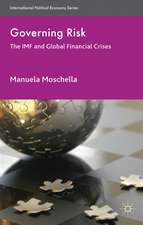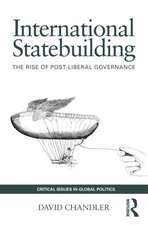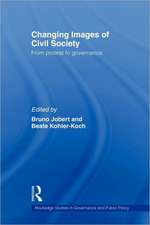Global Cooperation and the Human Factor in International Relations: Routledge Global Cooperation Series
Editat de Dirk Messner, Silke Weinlichen Limba Engleză Paperback – 21 dec 2017
As the first profoundly interdisciplinary book dealing with global cooperation, it provides the state of the art on human cooperation in selected disciplines (evolutionary anthropology and biology, decision-sciences, social psychology, complex system sciences), written by leading experts. The book argues that scholars in the field of global governance should know and could learn from what other disciplines tell us about the capabilities and limits of humans to cooperate. This new knowledge will generate food for thought and cause creative disturbances, allowing us a different interpretation of the obstacles to cooperation observed in world politics today. It also offers first accounts of interdisciplinary global cooperation research, for instance by exploring the possibilities and consequences of global we-identities, by describing the basic cooperation mechanism that are valid across disciplines, or by bringing an evolutionary perspective to diplomacy.
This book will be of great interest to scholars and postgraduates in International Relations, Global Governance and International Development.
| Toate formatele și edițiile | Preț | Express |
|---|---|---|
| Paperback (1) | 324.41 lei 6-8 săpt. | |
| Taylor & Francis – 21 dec 2017 | 324.41 lei 6-8 săpt. | |
| Hardback (1) | 822.20 lei 6-8 săpt. | |
| Taylor & Francis – 3 dec 2015 | 822.20 lei 6-8 săpt. |
Din seria Routledge Global Cooperation Series
-
 Preț: 386.57 lei
Preț: 386.57 lei - 20%
 Preț: 267.96 lei
Preț: 267.96 lei -
 Preț: 310.70 lei
Preț: 310.70 lei -
 Preț: 434.25 lei
Preț: 434.25 lei - 14%
 Preț: 299.45 lei
Preț: 299.45 lei -
 Preț: 305.50 lei
Preț: 305.50 lei - 26%
 Preț: 846.92 lei
Preț: 846.92 lei -
 Preț: 454.22 lei
Preț: 454.22 lei -
 Preț: 469.34 lei
Preț: 469.34 lei -
 Preț: 416.22 lei
Preț: 416.22 lei - 14%
 Preț: 338.68 lei
Preț: 338.68 lei - 17%
 Preț: 258.30 lei
Preț: 258.30 lei -
 Preț: 469.34 lei
Preț: 469.34 lei -
 Preț: 447.68 lei
Preț: 447.68 lei - 28%
 Preț: 819.09 lei
Preț: 819.09 lei - 19%
 Preț: 255.84 lei
Preț: 255.84 lei - 19%
 Preț: 259.07 lei
Preț: 259.07 lei - 31%
 Preț: 763.39 lei
Preț: 763.39 lei -
 Preț: 465.49 lei
Preț: 465.49 lei -
 Preț: 385.80 lei
Preț: 385.80 lei -
 Preț: 385.25 lei
Preț: 385.25 lei -
 Preț: 360.31 lei
Preț: 360.31 lei
Preț: 324.41 lei
Preț vechi: 378.78 lei
-14% Nou
Puncte Express: 487
Preț estimativ în valută:
62.08€ • 67.41$ • 52.15£
62.08€ • 67.41$ • 52.15£
Carte tipărită la comandă
Livrare economică 22 aprilie-06 mai
Preluare comenzi: 021 569.72.76
Specificații
ISBN-13: 9780815355106
ISBN-10: 0815355106
Pagini: 290
Ilustrații: 19 Line drawings, black and white; 3 Halftones, black and white; 6 Tables, black and white; 27 Illustrations, black and white
Dimensiuni: 156 x 234 x 15 mm
Greutate: 0.41 kg
Ediția:1
Editura: Taylor & Francis
Colecția Routledge
Seria Routledge Global Cooperation Series
Locul publicării:Oxford, United Kingdom
ISBN-10: 0815355106
Pagini: 290
Ilustrații: 19 Line drawings, black and white; 3 Halftones, black and white; 6 Tables, black and white; 27 Illustrations, black and white
Dimensiuni: 156 x 234 x 15 mm
Greutate: 0.41 kg
Ediția:1
Editura: Taylor & Francis
Colecția Routledge
Seria Routledge Global Cooperation Series
Locul publicării:Oxford, United Kingdom
Public țintă
PostgraduateCuprins
Part 1 Why Global Cooperation Research 1. The evolution of human cooperation—lessons learned for the future of global governance 2. The behavioral dimension of international cooperation 3. Cooperation in conflict. Ubiquity, limits and potential of working together at the international level Part 2 Human behavior and cooperation across disciplines 4. The cooperative bias in humans’ biological history 5. Cooperation among humans 6. Can we think of the future? Cognitive barriers to future-oriented decision making 7. Approaching cooperation via complexity 8. The concrete utopia of the gift. A genuine sociological approach to interdisciplinary cooperation theory Part 3 Interdisciplinary approaches to global cooperation 9. The possibilities of global we-identities 10. Diplomatic Cooperation: An evolutionary perspective 11. Cognizing cooperation: clues and cues for institutional design
Recenzii
"The new book is inspiring because it casts a new light on global cooperation." - Hans Dembowski, Development and Cooperation
Descriere
This book aims to pave the way for a new interdisciplinary approach to global cooperation research. It does so by bringing in disciplines whose insights about human behaviour might provide a crucial yet hitherto neglected foundation for understanding how and under which conditions global cooperation can succeed. It provides the state of the art on human cooperation in selected disciplines (evolutionary anthropology, decision-sciences, social psychology, complexity sciences), written by leading experts. The book also offers reflections on how to deal with the epistemological and methodological challenges that arise when bringing micro, meso and macro levels together.
















